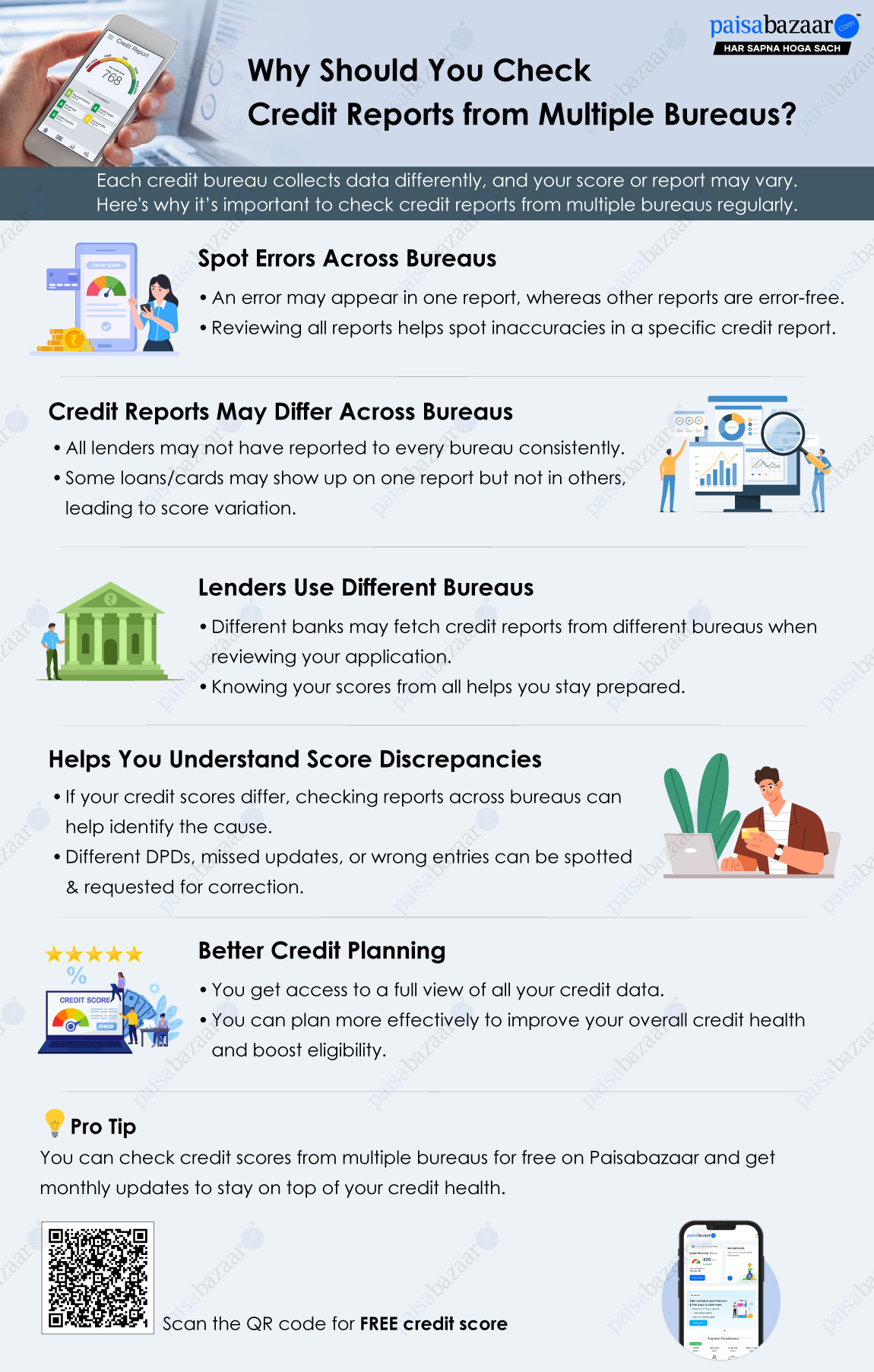Paisabazaar app Today!
Get instant access to loans, credit cards, and financial tools — all in one place
Our Advisors are available 7 days a week, 9:30 am - 6:30 pm to assist you with the best offers or help resolve any queries.
 Get the App
Get the App

Get instant access to loans, credit cards, and financial tools — all in one place

Scan to download on

600 or 750? What's your credit
score? Check for FREE.





Let’s Get Started
The entered number doesn't seem to be correct
All information regarding your credit history is mentioned in your credit report. Lenders assess your credit report at the time of credit approval. A credit report portraying the disciplined credit behaviour of a borrower will contain a high credit score. This not only increases the trust of the lender but also makes it more convenient for the borrower to access credit, whereas defaults and missed payments in the report can make it difficult for the borrower to access credit in future.
Four credit bureaus in India issue credit reports to all borrowers, namely – CIBIL, Experian, Equifax and CRIF High Mark. It is a good habit to check your credit report regularly, but it is a better habit to check credit reports from multiple credit bureaus regularly. Let us understand below why it is recommended to check credit reports from multiple bureaus regularly.
An error in your credit report can originate from either the lender’s part or the credit bureau’s part. If you witness the same error across all credit reports, it shows that the error originated from the lender’s end, which has shared incorrect data with all bureaus. Here, you should raise the rectification issue with the lender first.
When you see an error in a specific credit report and other reports don’t have it, it signifies that the error occurred due to an administrative fault of that bureau. So your issue will be resolved by raising a grievance directly with the bureau.
Also Read: Found Error in your Credit Report? Here’s How to Raise a Grievance
Some lenders may not share credit information diligently with all credit bureaus. Due to this, some loan accounts or credit cards may not feature in one report, but they would show in other reports. This can also be a reason for the difference in credit scores from different bureaus.
If you find that your latest information is not provided to a credit bureau by the lender for a long time, you can write to the lender and request for sharing your updated details with the credit bureau. However, as per the latest RBI guidelines, all lenders have to share the latest information of a borrower to all credit bureaus in a specified format that would help in keeping the credit reports of all bureaus updated.
Suggested Read: 5 New RBI Rules that Make Tracking Credit Health Easy
Various lenders have tie-ups with different credit bureaus for fetching credit reports of applicants at the time of credit approval. Staying aware of your credit standing in the eyes of all credit bureaus will help you stay prepared for every loan opportunity.
For example, one lender might use CIBIL, while another checks Experian or Equifax. This means your application may be evaluated using a report that shows a different credit score or loan history. Knowing your credit standing across multiple bureaus helps avoid surprises and improves your chances of approval.
Your credit scores may vary across bureaus because they collect and update data at different times, and lenders may report to some but not all. One bureau might show an overdue EMI while another doesn’t, causing a score gap. By comparing reports side by side, you can identify the cause of any inaccuracy, such as outdated DPDs, incorrect balances, or missing new accounts, and take steps to resolve it.
When you have a clear view of how each bureau is reporting your credit behaviour, you can plan more strategically. For instance, if your CIBIL score is low but your Experian score is healthy, you can prioritise lenders that check Experian. However, it is very difficult to figure out which lender requests credit reports from a certain bureau.

RBI has directed every credit bureau to provide one free detailed credit report to all borrowers every year. You can check these reports from the bureau’s website. However, to get the latest updates from all credit bureaus every month, you will have to purchase a subscription plan from each credit bureau. While it will surely be beneficial to stay updated with your latest credit reports across all bureaus, it will also cost you a fortune.
You can check credit scores from multiple bureaus for free on Paisabazaar and get monthly updates to stay on top of your credit health. In case you find errors or need expert assistance, you can subscribe to Paisabazaar’s Credit+ program and seek the help of a credit expert to resolve all your issues without much difficulty. After the resolution of errors in your report, your credit score increases significantly (depending on the severity of your credit health), and if your CIBIL score goes above 750, you become eligible for some of the best loan and credit card offers.